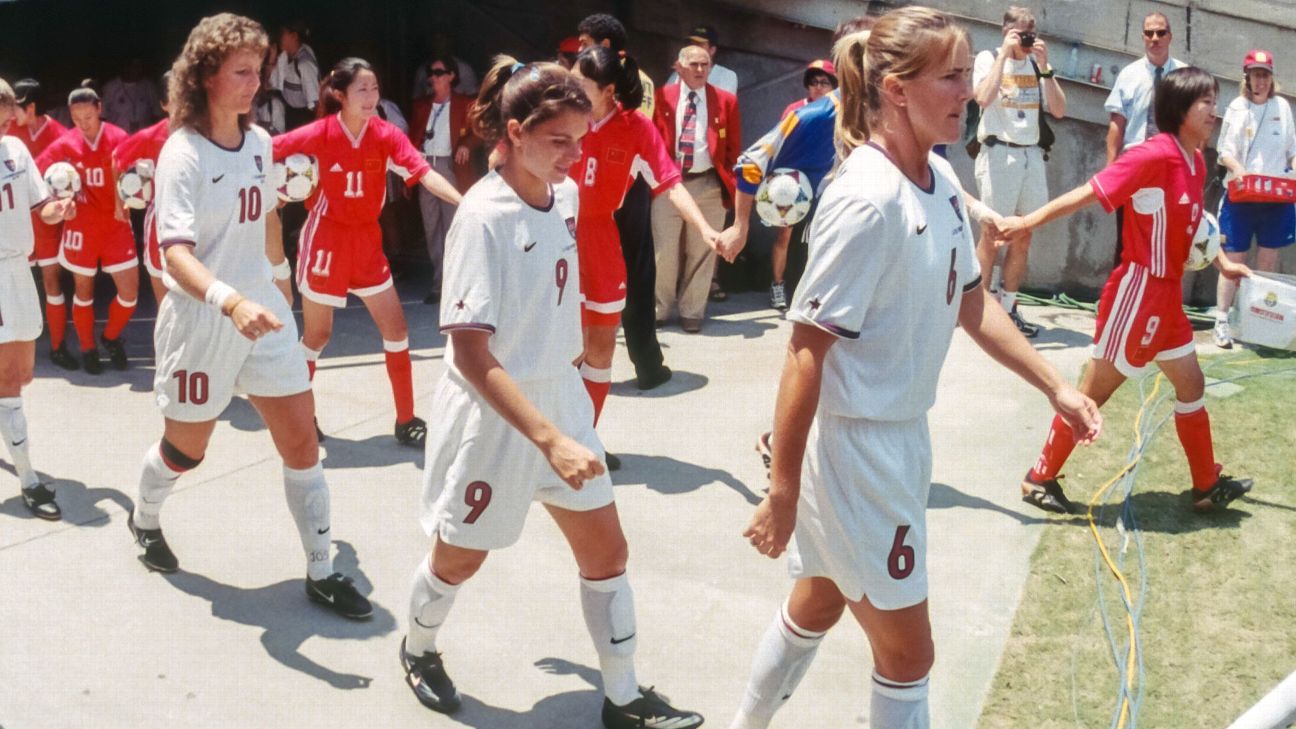Ten former elite players, including United States national team icons Michelle Akers and Brandi Chastain, have signed on to take part in a first-of-its kind study on the long-term effects of head impacts in high-level women’s soccer.
Akers, who suffers from chronic migraines, and Chastain — who in 2016 became one of the first professional women athletes to pledge to donate her brain to the Concussion Legacy Foundation for study upon her death — appeared on “CBS This Morning” on Thursday to announce their involvement in the landmark study, which will begin later this year.
“This is the first time they’re looking at female soccer players, female brains and it’s important to have this conversation,” Akers told ESPN.com by phone Friday morning. “This needs to be looked at equally for women and men, and until now, it hasn’t been.”
Dubbed SHINE — Soccer, Head Impacts and Neurological Effects — the study will look at former players over 40 who played a minimum of five years of organized soccer, with at least two of those years coming after high school and at least one year at the pro level or on a national or Olympic team. It will be led by Boston University professor of neurology Dr. Robert Stern, clinical research director for BU’s Chronic Traumatic Encephalopathy (CTE) center, and will be funded by the Concussion Legacy Foundation and the National Institute on Aging.
But the study was spearheaded by Akers, a member of the 1991 and 1999 Women’s World Cup championship teams and one of only two women to score five goals in a single World Cup match.
Two years ago, Akers said that despite her migraines and memory lapses, she’d never made a connection between heading “around 50 balls a game” and her symptoms, until she watched a documentary on retired English Premier League striker Alan Shearer titled, “Dementia, Football and Me.”
“It made sense,” Akers told ESPN.com. “I had never thought about CTE in the soccer world. I knew what was said about NFL players, but when I saw that documentary, I saw the connection to soccer. I thought, what are we doing about it? What’s going on around the world? I figured if this was happening to English professional players, then FIFA must be doing studies. There must be studies going on in the U.S. But when I started looking around, I found nothing.”
Akers said her persistent research eventually led her to Dr. Stern at Boston University and Chris Nowinski at the Concussion Legacy Foundation. “We got on a call together and Dr. Stern said, ‘We need to do a study on female soccer players,'” Akers said. “So, we set this whole thing in motion.”
Akers said she reached out to about 20 former teammates at the beginning of the current World Cup, and as of Friday, 10 players had signed on to participate in the study, including Cindy Parlow Cone, a former USWNT midfielder and Portland Thorns head coach.
“The response has been extremely positive,” Akers said. “Since the CBS interview ran yesterday, I’ve had a couple high-profile players reach out and ask, ‘How do I sign up?’ I’ve had people reach out saying they’ve had concussions, that they’re concerned for themselves and are so glad the research is going on. They see this study as progress in equality for women.”
Akers said that though she is uncertain if her migraines are the result of her playing career, aging or her genetics, she believes what is most important is to have an open conversation and begin to do the research that will provide athletes like herself with answers.
“It’s a subjective experience, so it’s difficult to determine if [the headaches and memory lapses] are Michelle being an airhead or overwhelmed and tired, or is this a post-concussion thing or CTE?” said Akers, who recently joined Chastain in pledging to donate her brain posthumously to the Concussion Legacy Foundation.
“That’s what we’re exploring and why we want to provide support for others. I wish I knew this information when I was younger. I headed the ball so much. I practiced heading the ball. Had I known, I never would have done that. Heading the ball is risky. It does damage to your brain. Should we take heading out of soccer? I don’t know. That’s why we need research.”
Akers said that while she will cheer from the comfort of her couch as the U.S. women take on France on Friday night, she admits that she watches games differently now.
“The Shearer documentary changed how I watch soccer,” Akers said. “I watch Carli Lloyd score on some beautiful header and I think, ‘That was a beautiful goal.’ Then my mind wanders down a different road and I think, ‘But what is the risk?'”
